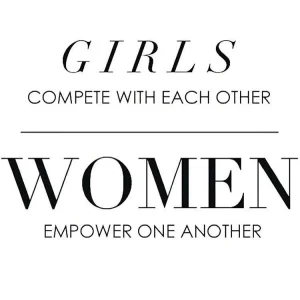Well I refer to that as an emblem of the 'disenchantment' of Europe, which often meant that female-only circles/professions (like midwifery) were broken up and monopolised by men because the women involved in them often had supernatural/witchy vibes. Sorry to imply that what you're talking about was limited to midwifery.
I think there's an interesting link between Englightenment/Disenchantment and the slow conquest of female public life by male and state power.
"Supernatural/witchy" = women with strength, power, wisdom, educations, etc. Any strong and capable woman could be labeled "witchy". Accusing women of witchcraft was an easy, phobic way to commit systematic misogyny and eradicate female importance and power. (Many) pre-Christian "pagan*" religions recognized women as powerful and women were well represented in both religion and society. Christianity only added the worship of the Virgin Mary to persuade hesitant pagans who were disinterested in converting because female gods were not represented. Many of the oldest statues and art of Christian deities were actually artifacts representing earlier pagan gods that were "repurposed" for the forced Christian agenda. Of course, the pagan holidays were repurposed as well.
Female wisdom, crafts, skills, sexuality, bodies.... were all labeled evil, primitive, "sinful", etc... because witchcraft was deemed "evil", though it is
not evil, and women held power in society during the pagan area, which was deemed a "primitive" and "unenlightened" time. This is Christian-washing, misogynist, and the focus of a massive genocide (ie the witch hunt) and centuries of oppression and inequality. There is nothing enlightened about this. It's hate.
Obviously, as science and knowledge progressed some practices were replaced with more advanced practices. As the caregivers, women should have been included in medical advancements in education and practices, especially with childbirth, but also with caring for the elders and caring for the wounded, which were common female roles during pagan times. Women were excluded from receiving educations and from being allowed to have careers, sometimes in the very fields of study that women dominated before Christian ideals wiped out our strength. It's all misogyny.
I didn't really want to get into a theological discussion because so many lovely people on this forum are Christian and I don't want to seem like I am attacking their faith, but this whole enlightened vs 'primitive' witchcraft thing is not going to fly with me.
Yes, science is greater and better than witchcraft, and witchcraft included superstition and ritual**, but many of the medicinal practices using (for example) herbs actually work, and were the basis for modern medicine. This knowledge should have advanced
with women, but women were
excluded because our society was misogynist.
"Witchcraft" is at the roots of science.
For example:
– The roots of astronomy and meteorology were a large part of pagan practices and holiday rituals. Holidays mattered because our survival depended on knowing when to plant the seeds (Imbolc) when the last harvest had to be in (Samhain) before winter, etc. It was very simple: If we did not follow weather patterns and astronomy that told us when the seasons changed
we would die. Folklore around full moons is not simple myth. Ye, stories evolved around full moons, but the full moon was when we hunted because we could see at night. So, the witchy, pagany full moon was purely practical. We knew the longest day of the year (Summer solstice) and the shortest (Winter Solstice) as well as the equinoxes and cross quarter days. We knew how to navigate via the stars. We understood our surroundings in the sky and on earth.
The church later condemned Galileo because studying astronomy challenged the Christian ideas of god. Newton was also considered a heretic. Calculus was blasphemous.
– Medicine. Plants and chemicals mimicking those plants are still the basis for medicines. Plants are powerful... the rainforest is full of plants used in medicine like chemotherapy. Opiates are from a flower. My former flower garden was accidentally full of plants that can induce miscarriage... and yes, those plants actually work and will cause abortions. I had to tell my friends who were trying to get pregnant to stay out of my garden. (This was purely accidental, and as I learned more about the history of plants I realized I had chosen a half dozen of these plants because they were pretty.) This was women's knowledge. Medicine from plants was women's knowledge. When Christianity took over this knowledge was kept secret, but women still used it and took great personal risks to share it. Caring for wounded warriors was women's knowledge, too. Women were warriors, too, and warrior remains previously "assumed" to be male (because our modern and "enlightened sensibilities told us women weren't fighters) have now been confirmed female. All this knowledge was taken from us and we were forced to, basically, become uneducated broodmares, maids, and cooks... and as home cooks we weren't even allowed to have the dignity of the title "chef". Chefs were men. The truly rebellious women dared to study. Women who chose to write or paint used pseudonyms. Women could be nurses, but we weren't allowed to become doctors or scientists. The few who dared were "scandalous". Women weren't even allowed to enjoy sex... yet at the same time, to this day, women are put "on trial" when they are raped, and they are both adored ad vilified as sexual 'objects'. The Madonna/Whore dichotomy is a product of Christianity. Women did not decide this for themselves. This oppression was forced upon us. Our wisdom was associated with 'primitive and evil' witchcraft.
Witchcraft should not be grouped in with the term "unenlightened" when what conquered it was so dark.
Per usual, I'm typing off the top of my head, so apologies for spelling and grammatical errors.
*pagan is a blanket term.
**spoiler: Christianity is superstitious and ritual-based, too.

![IMG_5755[911].webp IMG_5755[911].webp](https://www.infjs.com/data/attachments/38/38914-b0f1ad46a095693cf341a922c648b3f4.jpg?hash=hRAsGh01gG)


